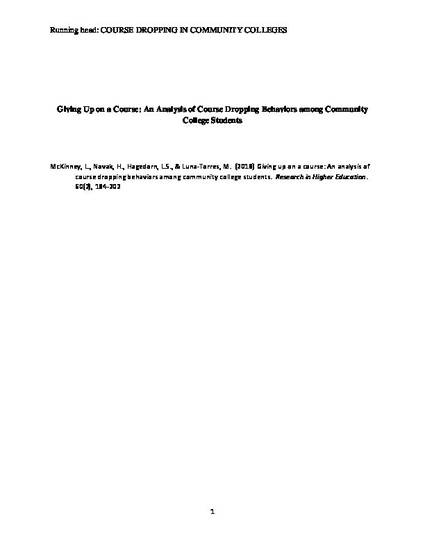
Excessive course dropping is costly to students and institutions. Using longitudinal transcript data, this study investigated course withdrawal patterns among 5900 students at a large, racially/ethnically diverse community college district in Texas. Two-thirds of the students dropped at least one course, and 13.5% of the total course enrollments resulted in withdrawal. Course withdrawal rates were significantly higher among students who were: male, African American, age 20–24, GED holders, academically underprepared, enrolled part-time, and had a cumulative college GPA of less than 2.0. Science, mathematics, and writing courses had high drop rates, as did Second Start and fully online courses. Dropping 20% or more of attempted courses was associated with 44% lower odds of a successful enrollment outcome. We hypothesize that community college students are rational, act in their own self-interest, and perform a cost–benefit analysis with the knowledge they possess when deciding whether to drop a particular course. However, students often overuse or misuse the course withdrawal function. Despite acting in self-interest at the moment, the decision to drop a course is often not in students’ long-term best interest, and excessive course dropping can resemble a ‘cooling out’ mechanism by which students’ reduce their aspirations toward degree completion. Recognizing community college structures and rules (e.g., withdrawal procedures, tuition refund policy) influence course dropping decisions, we describe academic policies and classroom practices that can help reduce course withdrawals. We believe that reducing course attrition is a foundational, yet often overlooked, mechanism for reducing community college attrition.
Available at: http://works.bepress.com/linda_hagedorn/44/

This accepted article is published as McKinney, L., Novak, H., Hagedorn, L.S. et al. Giving Up on a Course: An Analysis of Course Dropping Behaviors Among Community College Students. Res High Educ 60, 184–202 (2018). doi: 10.1007/s11162-018-9509-z. Posted with permission.